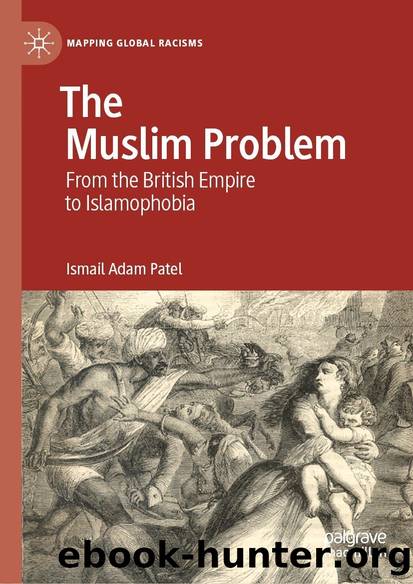The Muslim Problem by Ismail Adam Patel;

Author:Ismail Adam Patel;
Language: eng
Format: epub
ISBN: 9783030758424
Publisher: Springer Nature
The Caliphate and the Fatwa of Jihad
Aydin considers the collapse of the Ottoman Caliphate due to the failure of the Muslims rallying behind the fatwa4 for jihad in 1914 against the Entente powers. While anti-colonialist struggles were considered a form of jihad, the formal issuing of a fatwa for jihad was rare in the Ottoman Empire. In the 154 years between 1768 and 1922, the Ottoman Caliph only issued an âofficial jihadâ fatwa on six occasions (Shaw 2008: 760; Aksakal 2011: 189). Although the 1914 fatwa for jihad is important in its socio-political context, it is debatable whether the fatwa was influenced by Germany (Schwanitz 2004: 7) or emerged as an internal Ottoman initiative (Aksakal 2011: 196). Irrespective of the reason behind the genesis of the fatwa, its aim was to mobilise Muslims against the European colonialist enterprise. The retreat of Muslims to the call of Jihad was for Aydin (2017a: 348) due to their loyalty to the âBritish king who ruled over themâ with some having extracted political concessions from the British.
While a historical analysis of the fatwa not having galvanised the whole of the Musilmsphere for jihad has merits, this cannot be extrapolated as loyalty to the British crown or be interpreted as the indifference of the British to the figure of the Muslim. The lack of direct military capabilities or an absence of a united command and control structure became secondary to how the figure of the Muslim came to be imagined. The figure of the Muslim was perceived by the British as an ideological challenge and not unity of military resistance. The challenge of pan-Islamism is about a configuration of a grammar, a language, which confronted the centring of Britishness. Even during the peak of the British empire, imperialists like John Seeley (1914: 353) were warning that the imperial project was in the âperpetual dread of ⦠the Mussulman worldâ. In this sense pan-Islamism and the Mussulman world, destabilised imperial narrative and exceed Muslim military unity.
Muslims were problematised as Other because, for the British, the Muslim world facilitated people like Sayyid Fadl Alawi to weave a network of discontent. Fadl, an Indian, moved to Istanbul in 1880. From there he made political and business contacts within the Ottoman elites and âcould recruit with ease men from the labour markets as far east as Aceh, in Indonesia, Egypt and Morocco in North Africa, Kabul in Afghanistan, Istanbul, the Arab tribes in the Persian Gulf area and immigrant labour from Indiaâ (Alavi 2011: 1355). In this sense, the Muslim world for the imperialist incubates the dangers of Muslims. The perception of the figure of the Muslim as countering imperialism, led to their close monitoring. For the British, pan-Islamist irrespective of their lack in military strength and a weak bond to the Ottoman Caliph, posed the fear of an anti-colonialist narrative spreading across the empire. This danger was multi-directional that involved both the Ottoman centre engaging with the periphery and vice versa (Tabassum 2006: 47â59). The British Deputy Director of the Intelligence Bureau in India, P.
Download
This site does not store any files on its server. We only index and link to content provided by other sites. Please contact the content providers to delete copyright contents if any and email us, we'll remove relevant links or contents immediately.
| Buddhism | Christianity |
| Ethnic & Tribal | General |
| Hinduism | Islam |
| Judaism | New Age, Mythology & Occult |
| Religion, Politics & State |
Cecilia; Or, Memoirs of an Heiress — Volume 1 by Fanny Burney(31348)
Cecilia; Or, Memoirs of an Heiress — Volume 3 by Fanny Burney(30946)
Cecilia; Or, Memoirs of an Heiress — Volume 2 by Fanny Burney(30905)
The Secret History by Donna Tartt(16656)
Sapiens: A Brief History of Humankind by Yuval Noah Harari(13070)
Leonardo da Vinci by Walter Isaacson(11914)
The Radium Girls by Kate Moore(10914)
Sapiens by Yuval Noah Harari(4549)
The Wind in My Hair by Masih Alinejad(4427)
How Democracies Die by Steven Levitsky & Daniel Ziblatt(4408)
Homo Deus: A Brief History of Tomorrow by Yuval Noah Harari(4287)
Endurance: Shackleton's Incredible Voyage by Alfred Lansing(3853)
The Silk Roads by Peter Frankopan(3775)
Man's Search for Meaning by Viktor Frankl(3646)
Millionaire: The Philanderer, Gambler, and Duelist Who Invented Modern Finance by Janet Gleeson(3574)
The Rape of Nanking by Iris Chang(3525)
Hitler in Los Angeles by Steven J. Ross(3446)
The Motorcycle Diaries by Ernesto Che Guevara(3342)
Joan of Arc by Mary Gordon(3266)
